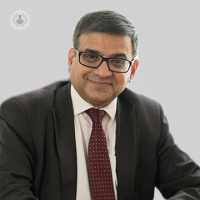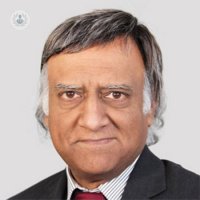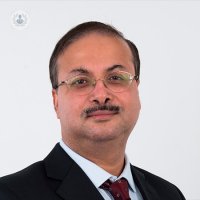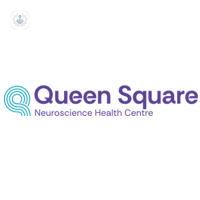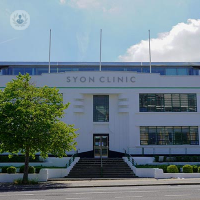What is colon cancer?
Colon cancer is the proliferation of malignant cells in the colon, which, along with the rectum, is in charge of storing faeces which are then expelled through the anus. This type of bowel-affecting cancer can develop due to polyps being being present and manifesting themelves in the bowel.
There are four main stages of colon cancer, and, of course, the earliest possible diagnosis in the early stage of the condition is key for a patient's recovery and survival.
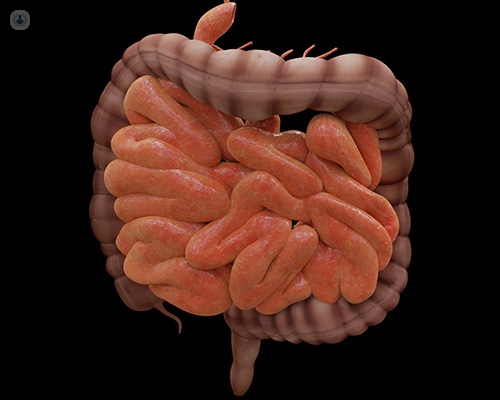
What are some early warning signs of colon cancer?
The main early warning sign of colon cancer is a change in bowel habit that does not improve after a couple of weeks even after the patient has been given various different standard treatments by their GP.
What causes colon cancer?
Its causes are determined by genetics, sedentary lifestyle and previous illnesses such as polyps, ulcerative colitis and other cancers.
What are the main symptoms?
The most obvious symptoms of the disease become visible when the disease is at an advanced stage. The main symptoms of colon cancer include:
- diarrhoea and constipation
- blood in the stool
- abdominal pain
- loss of appetite
- weight loss
- fatigue
How is it diagnosed?
An effective and very common assessment typically used to diagnose colon cancer is a colonoscopy, a thorough endoscopic examination that enables the bowel specialist to identify the cancer and hereafter extract biopsies. After these biopsies are taken, they can then be analysed by a pathologist who will confirm the diagnosis.
What does a colonoscopy involve?
A colonoscopy rigorously examines the entire colon area through the use of a lighted flexible instrument that has a microchip. This allows for an extremely detailed, high-quality definition image to be shown on screen for the gastroenterologist or colorectal surgeon to analyse.
How is it typically treated?
If colon cancer is detected and diagnosed early enough, then there is a good chance of cure, with the most common treatments being radiotherapy, chemotherapy, immunotherapy (to strengthen the body's defences), and finally, surgery.
What specialist should I see?
It is generally recommended that patients suffering from colon cancer see a colorectal surgeon.
10-21-2015 07-19-2023Colon cancer
What is colon cancer?
Colon cancer is the proliferation of malignant cells in the colon, which, along with the rectum, is in charge of storing faeces which are then expelled through the anus. This type of bowel-affecting cancer can develop due to polyps being being present and manifesting themelves in the bowel.
There are four main stages of colon cancer, and, of course, the earliest possible diagnosis in the early stage of the condition is key for a patient's recovery and survival.

What are some early warning signs of colon cancer?
The main early warning sign of colon cancer is a change in bowel habit that does not improve after a couple of weeks even after the patient has been given various different standard treatments by their GP.
What causes colon cancer?
Its causes are determined by genetics, sedentary lifestyle and previous illnesses such as polyps, ulcerative colitis and other cancers.
What are the main symptoms?
The most obvious symptoms of the disease become visible when the disease is at an advanced stage. The main symptoms of colon cancer include:
- diarrhoea and constipation
- blood in the stool
- abdominal pain
- loss of appetite
- weight loss
- fatigue
How is it diagnosed?
An effective and very common assessment typically used to diagnose colon cancer is a colonoscopy, a thorough endoscopic examination that enables the bowel specialist to identify the cancer and hereafter extract biopsies. After these biopsies are taken, they can then be analysed by a pathologist who will confirm the diagnosis.
What does a colonoscopy involve?
A colonoscopy rigorously examines the entire colon area through the use of a lighted flexible instrument that has a microchip. This allows for an extremely detailed, high-quality definition image to be shown on screen for the gastroenterologist or colorectal surgeon to analyse.
How is it typically treated?
If colon cancer is detected and diagnosed early enough, then there is a good chance of cure, with the most common treatments being radiotherapy, chemotherapy, immunotherapy (to strengthen the body's defences), and finally, surgery.
What specialist should I see?
It is generally recommended that patients suffering from colon cancer see a colorectal surgeon.


The silent signs of colon cancer: What you should never ignore
By Dr Rishi Goel
2024-12-30
Colon cancer, also known as colorectal cancer, is one of the most common types of cancer in the UK. It can develop without obvious symptoms, which is why it is often referred to as a ‘silent’ condition. In this article, leading consultant gastroenterologist Dr Rishi Goel talks about how recognising early warning signs is crucial for prompt diagnosis and treatment, which can significantly improve outcomes. See more


Bowel cancer: Causes, Symptoms and Treatments
By Mr Nicholas Reay-Jones
2024-12-30
Leading consultant surgeon and specialist coloproctologist Mr Nicholas Reay-Jones explains all you need to know about bowel cancer, including what the symptoms are, how a diagnosis is made, and what the risk factors are. See more


Colorectal cancer screening tests
By Dr Aathavan Loganayagam
2024-12-30
Consultant gastroenterologist Dr Aathavan Loganayagam discusses different colorectal cancer screening tests that detect the disease in its early stages in people who have no signs. See more


Colon cancer: 5 key symptoms to know
By Dr Aathavan Loganayagam
2024-12-29
People know that bad things may happen to their health but, of course, never consider that something as threatening as colon cancer could really happen to them. Recent reports show how younger age groups are now at risk for the disease. Leading London gastroenterologist Dr Aathavan Loganaygam is on hand with 5 cardinal symptoms to be mindful of... See more
Experts in Colon cancer
-
Mr Abhay Chopada
SurgeryExpert in:
- Bowel surgery
- Polyps
- Piles (haemorrhoids)
- Anal fistula
- Hiatal hernia surgery
- Colon cancer
-
Dr Morgan Moorghen
PathologyExpert in:
- Biopsy
- Colon cancer
- Gastrointestinal endoscopy
- Inflammatory bowel disease (IBD)
- Liver biopsy
-
Dr Debasis Majumdar
GastroenterologyExpert in:
- Endoscopy
- Colonoscopy
- Colon cancer
- Polyps
- ERCP
- Iron deficiency
-
Mr Danilo Miskovic
Colorectal surgeryExpert in:
- Colorectal cancer surgery
- Colon cancer
- Robotic surgery
- Laparoscopic hernia surgery
- Rectal surgery
- Bowel cancer
-
Mr Jonathan R L Wild
SurgeryExpert in:
- Colonoscopy
- Colon cancer
- HIPEC
- Colon and rectum cancer
- Haemorrhoid surgery
- Abdominal pain
- See all

Precision Surgery Group
Precision Surgery Group
King Edward VII's Hospital, 5-10 Beaumont Street, W1G 6AA
No existe teléfono en el centro.
By using the telephone number provided by TOP DOCTORS, you automatically agree to let us use your phone number for statistical and commercial purposes. For further information, read our Privacy Policy
Top Doctors

Amethyst: The Queen Square Neuroscience Health Centre
Amethyst: The Queen Square Neuroscience Health Centre
42-43 Queen Square London WC1N 3AQ
No existe teléfono en el centro.
By using the telephone number provided by TOP DOCTORS, you automatically agree to let us use your phone number for statistical and commercial purposes. For further information, read our Privacy Policy
Top Doctors

Syon Clinic - part of Circle Health Group
Syon Clinic - part of Circle Health Group
941 Great West Rd, Brentford TW8 9DU
No existe teléfono en el centro.
By using the telephone number provided by TOP DOCTORS, you automatically agree to let us use your phone number for statistical and commercial purposes. For further information, read our Privacy Policy
Top Doctors
-
Precision Surgery Group
King Edward VII's Hospital, 5-10 Beaumont Street, W1G 6AA, Central LondonExpert in:
- Robotic abdominal surgery
- Pelvic floor reconstructive surgery
- Robotic gallbladder surgery
- Robotic cancer surgery
- Robotic colorectal cancer surgery
- Robotic diverticulosis
-
Amethyst: The Queen Square Neuroscience Health Centre
42-43 Queen Square London WC1N 3AQ, Central LondonExpert in:
- Vascular Surgery
- Cancer pain
- Neurosurgery
- Neurology
- Medical Oncology
- Cancer Treatment
-
Syon Clinic - part of Circle Health Group
941 Great West Rd, Brentford TW8 9DU, West LondonExpert in:
- Allergies nose and ears
- Allergy Dermatitis
- Allergy
- Clinical analysis
- Anxiety
- Digestive
- See all
- Most viewed diseases, medical tests, and treatments
- Immunotherapy
- Alzheimer's disease
- CAR-T cells
- Hormone therapy
- Nutrition
- Weight loss injections
- Genetic testing
- Nipple discharge
- Abdominal pain
- Endovenous laser treatment (EVLA)
